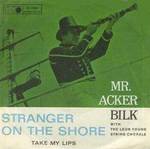
"Stranger on the Shore" is a piece for clarinet written by Acker Bilk for his young daughter and originally named "Jenny" after her. It was subsequently used as the theme tune of a BBC TV drama serial for young people, Stranger on the Shore. It was first released in 1961 in the UK, and then in the US, and reached number 1 in the US and number 2 in the UK.

"Dragostea Din Tei", also informally known as "Ma Ya Hi" and "The Numa Numa Song" (see § Lyrics), is the most successful single by the Moldovan pop group O-Zone. It received positive reviews from critics and shot to the number one spot on the Eurochart Hot 100, where it remained for 12 weeks between June and early September 2004. It topped the single charts in France, Germany and Austria for over three months, reached three in the United Kingdom and 72 on the US Pop 100. The song became the fourth-best-selling single of the 21st century in France, with 1,170,000 units sold. A popular cover of the song was made by Italian-Romanian pop singer Haiducii, which also charted in many countries, especially Italy and Sweden, where it topped the singles charts. The original song was made notable in the United States by the viral video "Numa Numa" in which Gary Brolsma dances to the song. Another remix "Numa Numa 2" with Dan Balan featuring Marley Waters was posted on YouTube on September 12, 2018.
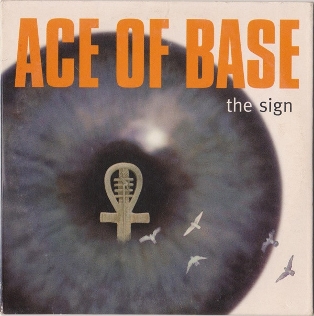
"The Sign" is a song by the Swedish band Ace of Base, which was released on 29 October 1993 in Europe. It was an international hit, reaching number two in the United Kingdom and spending six non-consecutive weeks at number one on the Billboard Hot 100 chart in the United States. More prominently, it became the top song on Billboard's 1994 Year End Chart. It appeared on the band's album Happy Nation.

"Mr. Sandman" is a popular song written by Pat Ballard which was published in 1954 and first recorded in May of that year by Vaughn Monroe & His Orchestra and later that same year by The Chordettes and The Four Aces. The song's lyrics convey a request to "Mr. Sandman" to "bring me a dream" – the traditional association with the folkloric figure, the sandman. The pronoun used to refer to the desired dream is often changed depending on the sex of the singer or group performing the song, as the original sheet music publication, which includes male and female versions of the lyrics, intended. The chord progression in each chorus follows the circle of fifths for six chords in a row. Emmylou Harris' recording of the song was a hit in multiple countries in 1981.
"Goodnite, Sweetheart, Goodnite" is a popular song that was a hit during the mid-1950s. It was written by Calvin Carter and James "Pookie" Hudson in 1951, and was first recorded by The Spaniels in 1953. It has also been released by some artists as "Goodnight, Well It's Time to Go".
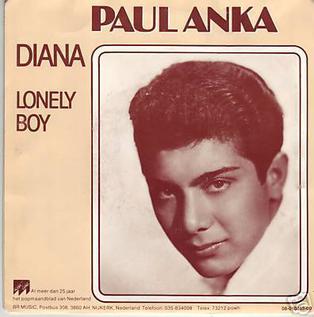
"Diana" is a song written and made famous by Paul Anka in 1957, recorded in May 1957 at Don Costa studio in New York City. Anka stated in his autobiography that the song was inspired by a girl named Diana Ayoub, whom he had met at his church and community events, and had developed a crush on. Session musicians on the record included Bucky Pizzarelli on Guitar, Irving Wexler on piano, Jerry Bruno on bass, and Panama Francis on drums. The song was recorded in May 1957 at RCA studios. Backup singers included Artie Ripp.
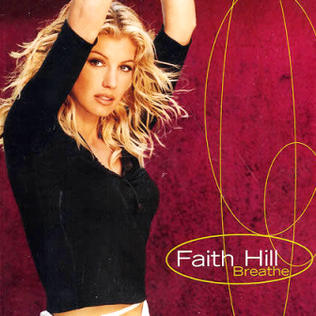
"Breathe" is a song written by Stephanie Bentley and Holly Lamar and recorded by American country music artist Faith Hill. It was released in October 1999 as the first single from her fourth album of the same name. "Breathe" became Hill's seventh number one on the Hot Country Songs chart in the US. The song spent six weeks at number one on the Billboard Hot Country Songs chart in December 1999 and January 2000. It also peaked at number 2 on the Billboard Hot 100 chart in April 2000. Despite not peaking at number one, it was the number one single of 2000, becoming only the second single at the time to top the year end charts despite never spending a week at the top of the weekly charts and marking the first time this had happened in 35 years.
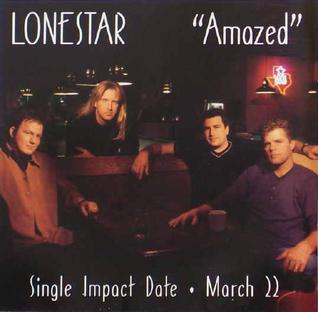
"Amazed" is a song by American country music group Lonestar, released in March 1999 as the second single from their third studio album Lonely Grill (1999). It is the band's longest-lasting number one single and biggest hit, spending eight weeks at the top of the Billboard country chart. The song was written by Marv Green, Aimee Mayo, and Chris Lindsey. A remix of the song was released in December 1999, and reached number one on the Billboard Hot 100 and number 2 on the Hot Adult Contemporary Tracks charts in 2000. The song has sold over 1,650,000 digital copies in the US as of February 2016.

"Rockin' Around the Christmas Tree" is a Christmas song written by Johnny Marks and recorded by Brenda Lee in 1958; it has since been recorded by numerous other music artists. By the song's 50th anniversary in 2008, Lee's original version had sold over 25 million copies with the 4th most digital downloads sold of any Christmas single.
Gerald Granahan is an American singer, songwriter, and record producer, best known for his work in the 1950s and 1960s.

"Closer" is a song by American recording artist Ne-Yo. The song was written and produced by Ne-Yo and Stargate. It was released as the lead single from Ne-Yo's third studio album Year of the Gentleman (2008).
"Return to Me" is a song released in 1958 by Dean Martin. The song spent 22 weeks on the United Kingdom's New Musical Express chart, peaking at No. 2, while reaching No. 1 in the Netherlands, No. 5 on Canada's CHUM Hit Parade, No. 7 in Flanders, and No. 8 on Norway's VG-lista. In the United States, the song reached No. 4 on Billboard's Top 100 Sides, No. 4 on Billboard's chart of "Best Selling Pop Singles in Stores”, and No. 4 on Billboard's chart of "Most Played by Jockeys".
"Feel So Fine" is a song released in 1960 by Johnny Preston. The song is a reworking of the 1955 song "Feel So Good" by Shirley & Lee, with modified lyrics.
"Please Love Me Forever" is a song written by John Malone and Ollie Blanchard. The song was originally released by Tommy Edwards in 1958. Hit versions were later released by Cathy Jean and the Roommates in 1960 and Bobby Vinton in 1967.
"My Heart Belongs to Only You" is a song written by Frank Daniels & Dorothy Daniels. Bette McLaurin and June Christy both released versions of the song in 1952. The most successful version of the song was released by Bobby Vinton in 1964.
"Long Lonely Nights" is a song that was originally released by Lee Andrews & the Hearts in 1957. Hit versions were also released by Clyde McPhatter, later in 1957, and Bobby Vinton in 1965. The song was written by Lee Andrews, though Larry Brown, Doug Henderson, and Mimi Uniman were given songwriter credit as well, in a practice that was common at the time.
"Big Man" is a song released by The Four Preps in 1958. The song reached No. 5 on Billboard's Top 100 Sides chart, while reaching No. 3 on Billboard's chart of sides "Most Played by Jockeys", and No. 6 on Billboard's chart of "Best Selling Pop Singles in Stores". The song also reached No. 2 on the United Kingdom's New Musical Express chart and No. 4 on Canada's CHUM Hit Parade.
"Missing You" is a song written by Red Sovine and Dale Noe, which was originally released by Red Sovine in 1955, and was later a hit single for Webb Pierce in 1957, Ray Peterson in 1961, and was posthumously a hit for Jim Reeves in 1972. Sovine's version was the B-side of Red Sovine and Webb Pierce's hit single "Why Baby Why".
"The Day the Rains Came" is a song made famous by Jane Morgan, which she released in 1958 as a single and on the album The Day the Rains Came. The song is an adaptation of the French language song "Le jour où la pluie viendra", which itself was the B-side of Morgan’s version. The French lyrics were written by Pierre Delanoë. The music was composed by Gilbert Bécaud and the English lyrics were written by Carl Sigman.











